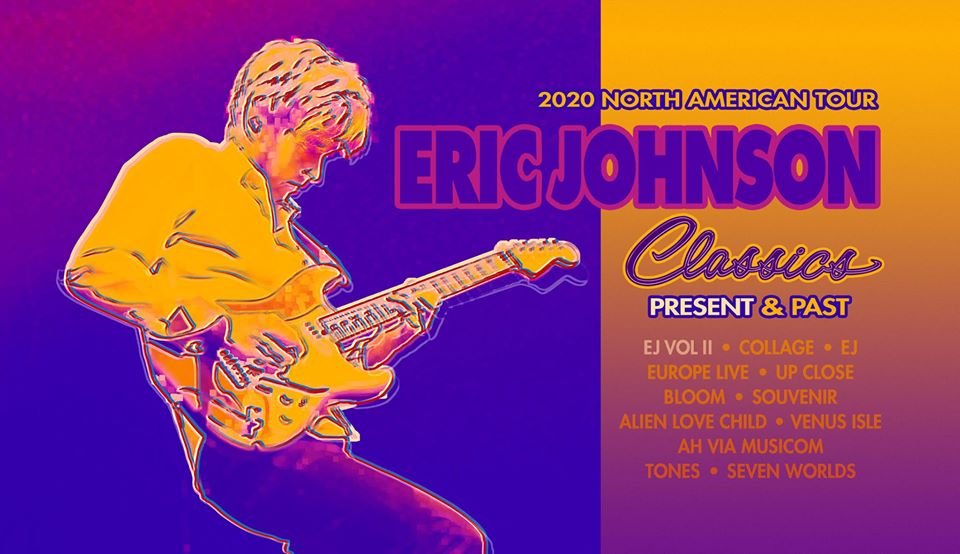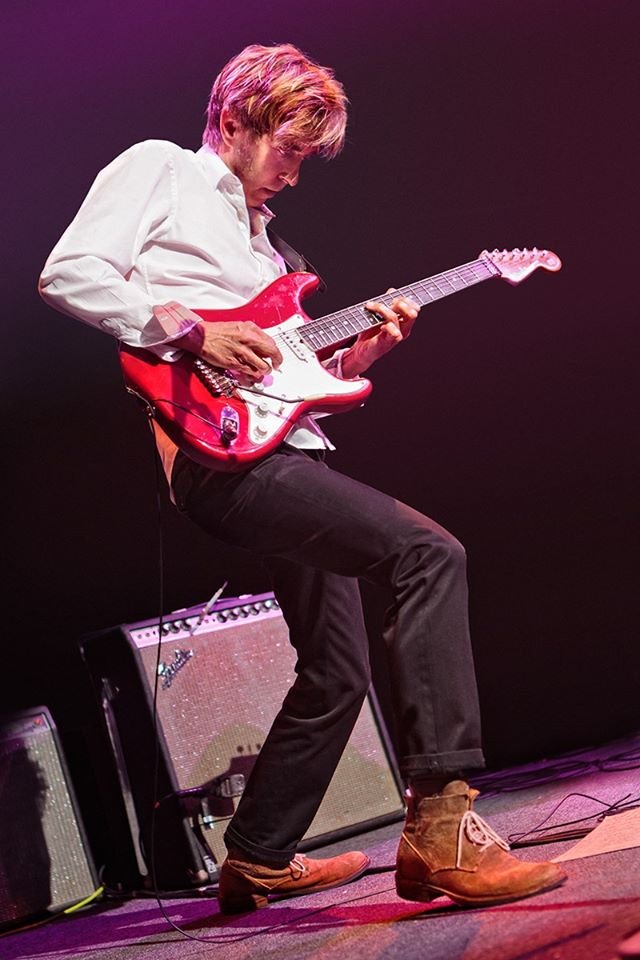
Billed as a night of “classics past and present,” Eric Johnson’s performance at the Paramount Theater in Denver was a career retrospective, showcasing the master guitarist’s best-known songs and celebrating his influences in reliably virtuosic fashion. But his setlist defied many of the conventions of a “greatest hits” show, and in its most spirited moments the performance reminded us that part of Johnson’s greatness has always been his refusal to be defined by his past.
Johnson occupies a rarified spot in the guitar pantheon. Many guitarists have tried to hot-rod otherwise basic rock and blues with high-octane technical playing, but few have accomplished this with the elegance and fluidity that are the hallmarks of Johnson’s style. He’s not the only one “pick-slanting” his arpeggios for greater precision, or bounding through the pentatonic at the speed of light. But with Johnson, the welds are always invisible and the feats of guitar wizardry never feel like a stunt. Tastefulness, and a certain restraint in the service of melodicism, are integral to his style.
Further reinforcing his reputation as a “guitarist’s guitarist” is Johnson’s attention to his tone. Attuned to nuance and uncompromising in his standards, Johnson has been famous for tweaking the small stuff in pursuit of the big sound. Tall tales, some surely apocryphal but perhaps directionally accurate, have circulated about Johnson intentionally depleting the 9-volt batteries of his effects rig, or being hyper-sensitive to the lengths of patch cables or the brand of transistors found in his fuzz pedal, all in pursuit of the right tone. The signature Stratocaster built to his specifications is famously free of headstock string trees and copper shielding in the electronics cavity, the minor but meaningful preferences of a tone purist who insists that his instrument sing, sing, sing. The resulting sound–crystalline, ringing clean tones and melty, expressive leads–is among the most distinctive in the electric guitar world.
And yet, for as distinctive as his tone may be, Johnson’s overall musical style has defied easy categorization, and remained in constant flux. His roots remain in the blues, and the big Texas guitar sound of his native Austin. But over the years he has swerved quite capably into jazz, country and folk, even moments of Motown, as he has channeled his influences from these genres. He’s been part of an all-Hendrix tribute show. He has experimented with pedal steel and the Japanese koto. He’s comfortable on the keys; before picking up the guitar as a child, he took years of classical piano lessons. And he’s had a long-term affair with the acoustic guitar, that in 2016 resulted in EJ, a stripped-down, all-acoustic album. To speak of Johnson’s style is to refer not to a single star but to a constellation. And
It was only three years ago that Johnson appeared down the road in Englewood, Colorado promoting EJ (2016) and sharing a piano-and-vocal side that swam against a current of audience expectations, but movingly demonstrated his need to follow his musical intuitions, wherever they might lead. This time around he’s back on the electric–at least for now–and he wastes no time deploying the creamy, resonant overdriven leads that the audience so clearly is here to see.
He kicks it off with “The Things We Said Today,” a tune from the Beatles’ back catalogue (specifically, the B-side of the single “A Hard Day’s Night”). According to Paul McCartney, it’s a song about “future nostalgia,” an awareness of the resonance the present moment will have upon the future. It’s an appropriate note upon which to begin a night in which the past is a path to the present, as opposed to the other way around.
The first set emphasizes Johnson’s diverse influences. Jazz is in the foreground, with expressive interpretations of Wes Montgomery and John Coltrane tunes. “Impressions,” which substitutes Johnson’s guitar for Coltrane’s sax, is particularly creative. But there’s also “S.R.V.”, a quick uptempo blues rocker off Johnson’s 1996 Venus Isle album, penned in appreciation of his fellow Austin guitar icon Stevie Ray Vaughan. Jimi Hendrix is another major influence, a fact Johnson underscores with “Drifting,” an obscure and haunting tune and the first of the evening’s two Hendrix covers. He goes way back with “Friends,” an early-career tune with a monster opening riff that morphs into a soulful paen to friendship, and a peppy rendition of “Soulful Terrain,” from Tones (1986). But the true early-career masterpieces for which Johnson is best known all appear on Ah Via Musicom, his 1990 breakout album, which had three top-10 Billboard hits, including “Cliffs of Dover,” which would win him a Grammy for Best Rock Instrumental Performance in 1992. Johnson hits “Trademark” first, with its controlled bluesy buildup that pours into a soaring high-register solo; “Righteous,” long a feature on FM radio, is an up-tempo tube-melter that ends the first set on a high note. And in between these blasts from the past, some very different glimpses at the future: “Waterwheel,” about finding one’s spiritual flow, and “Over the Moon,” a simple, elegant love song. Both are set to appear on his forthcoming EJ Vol. 2 album, and both feature Johnson on piano, not guitar.
The second set continues the eclecticism. Highlights include “Manhattan,” a smooth-jazz tune released on Venus Isle (1996), but which he’d been polishing for at least twelve years prior; Ah Via Musicom power-pop-ballad “Desert Rose,” and a warm-hearted new anthem built around a Keith Richards-esque riff, “Have a Good Time.” There’s another Beatles cover (“Mother Nature’s Son”) and Bert Jansch’s “Black Waterside,” which reveals Johnson’s nimble acoustic fingerpicking. For a few songs he ditches the Stratcaster in favor of a Les Paul, which offers up a rounder, mellower take on his signature tone. Some years back he had admitted to an aversion to Les Pauls, finding their humbucking pickups too unwieldy for his carefully-sculpted tone. But that was the past, and this is now. The band jams some tunes out, relishing the easy, fluid groove they have built.
About the band. Johnson has always hired quality musicians to back him up, but on this tour he seems to be allowing them more of the spotlight. Drummer Tom Brechtlein, who has played with Chick Corea, Robben Ford, and Al DiMeola, plays with power and a crisp energy. Bassist Roscoe Beck is an industry fixture who has also played with Robben Ford and Leonard Cohen but also the Dixie Chicks. But it’s the tall, bearded Austinite Dave Scher who emerges as the band’s musical polymath whiz-kid, tending to the synth and singing some vocals and even at one point picking up a second bass guitar. Also, he plays guitar. And starting in the second set, Johnson and Scher begin trading off guitar solos, and it becomes clear that Scher is totally capable of holding his own in the melodic-shredding department. One suspects that in any other band, he’d be the guitar hero.
Johnson holds back “Cliffs of Dover” until the end of the second set. With its freestyle intro, catchy melody, and blazing solos, it’s the tune that even casual Johnson fans recognize. It’s a fast Texas shuffle, and playing live he usually plays it even faster, almost to the point at which his solos strain under the speed. But tonight it seems especially brisk. Is there a reason the band seems to be rushing through this one? It’s tempting, given the evening’s general eclecticism and emphasis on newness, variety and musical exploration, to speculate. But perhaps it does not matter. Johnson is a professional and delivers a powerful rendition, and the epic tone pouring out of the Strat around which his body is curled demonstrates why, for better or for worse, “Cliffs of Dover” remains his signature song.
The encores continue the past-present binary, featuring a new piano tune “Shining Love” that ramps up into “Zap,” one of Johnson’s earliest virtuoso pieces. They jam it out for a while; Beck gets a prodigious bass solo. Finally, in the second encore, the band wraps up with a vigorous cover of Hendrix’s “Spanish Castle Magic” that Johnson has reworked into his own style.
Hendrix’s mainstream career lasted only four years; Johnson’s is pushing forty. And at a time when many of Johnson’s contemporaries are reveling in past glories as they take their final victory laps, Johnson continues moving forward, as guided by his creative intuition. His night in Denver was a celebration of the past, to be sure, but also an assertion of emancipation.
EJ Vol. 2 drops February 28.


